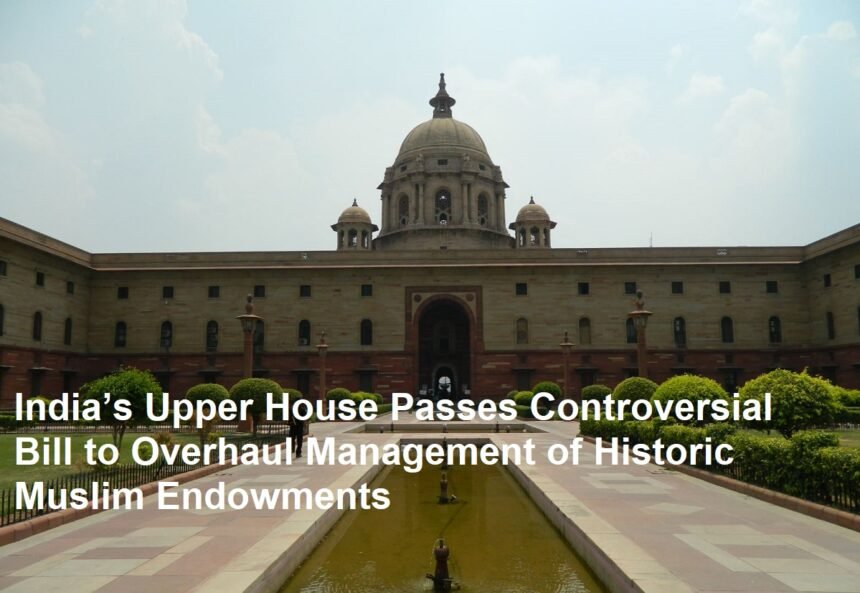April 4, 2025 — India’s Rajya Sabha (Upper House of Parliament) approved a contentious bill on Friday seeking to reform the administration of centuries-old Muslim charitable endowments, known as waqf properties, valued at over $20 billion. The move has ignited fierce backlash from Muslim organizations, opposition parties, and legal experts, who accuse the government of undermining religious autonomy and targeting minority institutions.
The Waqf Management Bill: Key Provisions
The proposed legislation, titled the Waqf Properties Governance and Transparency Act, 2025, centralizes oversight of India’s 800,000 registered waqf assets—including mosques, cemeteries, schools, and commercial lands—under a federally appointed board. The government argues the bill will curb corruption, ensure “efficient use” of resources, and redirect surplus funds toward public welfare schemes. Key clauses mandate annual audits of waqf boards, prohibit leases exceeding 10 years without state approval, and allow the government to repurpose “underutilized” properties for infrastructure projects.
Critics, however, call the law a brazen overreach. “This is not about transparency—it’s about control,” said Asaduddin Owaisi, leader of the All India Majlis-e-Ittehadul Muslimeen (AIMIM). “Waqf properties are a sacred trust meant for Muslim welfare. The state has no right to seize or monetize them.”
Historical and Political Context
Waqf assets, governed by Islamic principles, are managed by state-appointed boards under the 1995 Waqf Act. These properties generate income through rents and donations, funding religious, educational, and social initiatives for India’s 200 million Muslims. The new bill, backed by Prime Minister Narendra Modi’s ruling Bharatiya Janata Party (BJP), aligns with the government’s broader push to regulate religious endowments. In 2020, similar reforms targeted Hindu temple funds, sparking debate over state interference in religious affairs.
Opponents allege the BJP, long accused of marginalizing Muslims, is weaponizing governance to dilute minority rights. “This is part of a systemic agenda to erase Muslim influence from public life,” said Zoya Hasan, a political scientist at Jawaharlal Nehru University. She cited recent policies like the Citizenship Amendment Act (CAA) and the National Register of Citizens (NRC), which critics argue disproportionately affect Muslims.
Economic Stakes and Community Fears
The economic implications are vast. Waqf holdings include prime urban land in cities like Mumbai and Delhi, historic sites like Delhi’s Jama Masjid, and thousands of rural properties. Muslim leaders warn that centralized control could displace communities reliant on waqf-run housing and schools. “These assets are lifelines for poor Muslims. Handing them to bureaucrats will lead to exploitation,” said Maulana Mahmood Madani of the Jamiat Ulema-e-Hind.
The government denies communal motives. “This bill protects waqf assets from mismanagement and ensures their benefits reach all Indians, regardless of faith,” argued Law Minister Arjun Ram Meghwal. Officials cite a 2023 Comptroller and Auditor General (CAG) report revealing $1.2 billion in irregularities across state waqf boards, including illegal land sales and embezzlement.
Legal and Constitutional Challenges
Legal experts question the bill’s constitutionality. Article 26 of India’s Constitution grants religious groups the right to manage their own affairs. “The state can regulate, but not usurp,” said senior advocate Prashant Bhushan. “This law violates the basic structure of the Constitution.” The All India Muslim Personal Law Board (AIMPLB) has vowed to challenge the bill in the Supreme Court if it clears the Lok Sabha (Lower House), where the BJP holds a majority.
Broader Implications
The bill’s passage coincides with rising religious polarization ahead of India’s 2026 general elections. Analysts warn it could deepen distrust among Muslims, who feel increasingly alienated under BJP rule. International human rights groups, including Amnesty International, have raised concerns about “discriminatory governance.”
Meanwhile, the government faces pressure from its Hindu nationalist base to expand reforms to other religious trusts. “Why should only Hindu temples be under state control?” asked BJP MP Tejasvi Surya. “All religious institutions must follow the same rules.”
What’s Next?
The bill now moves to the Lok Sabha, where swift approval is expected. Presidential assent would cement it into law, likely triggering protests and legal battles. For Modi’s government, the reforms represent a gamble: balancing promises of “good governance” against accusations of majoritarian overreach.
As debates rage, India’s Muslim community braces for a fight to preserve its heritage. “Waqf is not just property—it’s our identity,” said activist Fatima Khan. “We will resist this theft.”












